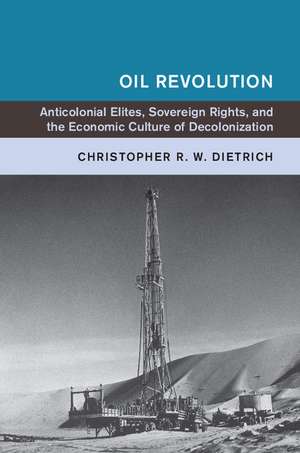Oil Revolution: Anticolonial Elites, Sovereign Rights, and the Economic Culture of Decolonization: Global and International History
Autor Christopher R. W. Dietrichen Limba Engleză Paperback – 15 iun 2017
| Toate formatele și edițiile | Preț | Express |
|---|---|---|
| Paperback (1) | 290.76 lei 6-8 săpt. | |
| Cambridge University Press – 15 iun 2017 | 290.76 lei 6-8 săpt. | |
| Hardback (1) | 643.03 lei 6-8 săpt. | |
| Cambridge University Press – 25 iun 2017 | 643.03 lei 6-8 săpt. |
Din seria Global and International History
-
 Preț: 241.02 lei
Preț: 241.02 lei -
 Preț: 291.69 lei
Preț: 291.69 lei -
 Preț: 289.01 lei
Preț: 289.01 lei -
 Preț: 288.04 lei
Preț: 288.04 lei -
 Preț: 308.21 lei
Preț: 308.21 lei -
 Preț: 200.99 lei
Preț: 200.99 lei -
 Preț: 232.89 lei
Preț: 232.89 lei -
 Preț: 241.77 lei
Preț: 241.77 lei -
 Preț: 240.81 lei
Preț: 240.81 lei -
 Preț: 225.38 lei
Preț: 225.38 lei -
 Preț: 238.52 lei
Preț: 238.52 lei -
 Preț: 228.85 lei
Preț: 228.85 lei -
 Preț: 208.68 lei
Preț: 208.68 lei -
 Preț: 308.01 lei
Preț: 308.01 lei - 11%
 Preț: 704.84 lei
Preț: 704.84 lei - 11%
 Preț: 642.68 lei
Preț: 642.68 lei - 11%
 Preț: 640.61 lei
Preț: 640.61 lei
Preț: 290.76 lei
Nou
Puncte Express: 436
Preț estimativ în valută:
55.64€ • 58.25$ • 46.04£
55.64€ • 58.25$ • 46.04£
Carte tipărită la comandă
Livrare economică 05-19 aprilie
Preluare comenzi: 021 569.72.76
Specificații
ISBN-13: 9781316617892
ISBN-10: 1316617890
Pagini: 366
Dimensiuni: 156 x 227 x 21 mm
Greutate: 0.52 kg
Editura: Cambridge University Press
Colecția Cambridge University Press
Seria Global and International History
Locul publicării:New York, United States
ISBN-10: 1316617890
Pagini: 366
Dimensiuni: 156 x 227 x 21 mm
Greutate: 0.52 kg
Editura: Cambridge University Press
Colecția Cambridge University Press
Seria Global and International History
Locul publicării:New York, United States
Cuprins
Introduction. The cash-value of decolonization; 1. One periphery: the creation of sovereign rights, 1949–55; 2. Past concessions: the Arab League, sovereign rights, and OPEC, 1955–60; 3. Histories of petroleum colonization: oil elites and sovereign rights, 1960–7; 4. Rights and failure: the 1967 Arab oil embargo; 5. Nationalist heroes: imperial withdrawal, the Cold War, and oil control, 1967–70; 6. A turning point of our history: the insurrectionists and oil, 1970–1; 7. A fact of life: the consolidation of sovereign rights, 1971–3; 8. The OPEC syndrome: the Third World's energy crisis, 1973–5; Conclusion. Dead by its own law? Decolonization, sovereignty, and culture.
Recenzii
'Dietrich's Oil Revolution is a triumph of research and writing. This is an indispensable book, illuminating the central role petroleum played in the transition from the global Keynesianism of the 1960s to the neoliberalism of the 1980s. A tour-de-force synthesis of intellectual, political, and economic history.' Greg Grandin, New York University
'In this compelling history, Dietrich takes the international politics of oil as a starting point to not only explore how Third World elites offered revolutionary new claims for economic sovereignty but also to demonstrate the absolute centrality of the global South in the making of the late twentieth century world.' Mark Philip Bradley, University of Chicago
'A game-changing account of where the ideas that matter to the world economy come from. Dietrich traces the work of the Arab and kindred anticolonial intellectuals who led the successful movement for national sovereignty over natural resources.' Robert Vitalis, University of Pennsylvania and author of the forthcoming Oilcraft
'As Dietrich shows in this brilliant and essential new account, the oil crisis of 1973–74 culminated in a decades-long anti-colonial campaign, waged by Third World elites for control of economic resources. Dietrich expands our understanding of the politics of oil and achieves new vantage on global change. His achievement is vital reading for students of post-1945 international politics and economics.' Daniel Sargent, University of California, Berkeley
'An outstanding book on the relationship between sovereignty and international economic justice, highlighting how the search for fairer oil prices changed some of the most fundamental aspects of international affairs.' O. A. Westad, Harvard University, Massachusetts and author of The Cold War: A World History
'In this beautifully conceived study, Christopher R. W. Dietrich uses the history of sovereign rights over oil to show the power and the profound limits of legal ideas during the era of decolonization and its aftermath. For anti-colonial elites, sovereign rights redressed past wrongs and also democratized global politics, but their vision ultimately foundered under the burden of sovereign debt. Highly recommended.' Mary L. Dudziak, Asa Griggs Candler Professor of Law, Emory University, Georgia and President of the Society for Historians of American Foreign Relations
'This work weaves together the history of oil from the 50's through the 70's with a post-colonial struggle for international economic justice. It is at once an analytical account of international economic history and of international law through the eyes of anti-colonial elites who sought an end to their countries' underdevelopment by claiming sovereignty over their natural resources. Beautifully researched, this compelling book is a testament to Dr Dietrich's keen ability to elucidate this critical period of twentieth century global history.' Margot E. Salomon, London School of Economics and Political Science
'This volume (a revised doctoral dissertation) is well researched and persuasively argued. Dietrich believes sovereign rights' advances brought about a 'profound change in human history', yet they did not inaugurate a new international economic order, equalizing conditions of global north and south. Recommended.' G. A. McBeath, Choice
'The originality of the research, especially the excavation of the pivotal role played by transnational oil elites, makes the book an important resource for scholars of international history and international political economy. Indeed, no concise, thorough, and readable narrative of this period in oil history has been available until the publication of this book.' Brandon Wolfe-Hunnicutt, Journal of Interdisciplinary History
'By taking oil elites, anticolonial elites in general, and their ideas seriously and by treating them respectfully though not uncritically, Dietrich has reminded us that while the powerful generally prevail, the ideas and actions of the less powerful are important and can have an impact.' David S. Painter, H-Diplo Roundtable Review
'In his superb account of anticolonial elite networks, decolonization, and the twentieth-century history of global oil, Christopher R. W. Dietrich contributes to a number of different strands of scholarship. … Oil Revolution should be considered one of those transformative texts that both breaks new ground in terms of how historians understand the evolution of the international oil economy and lights the way towards a multitude of new histories of the decolonizing, post-colonial and Cold War era.' Ben Offiler, H-Diplo Roundtable Review
'Dietrich's book is an outstanding piece of scholarship, which engages the entangled histories of economic decolonization and international law.' Sara Lorenzini, H-Diplo Roundtable Review
'Dietrich provides a rich history of ideas, linking the work of the new elite on the nature of oil concessions to an array of European and American intellectuals concerned with international law and economic development, such as Albert O. Hirschman and Gunnar Myrdal … There is much to recommend in this work and its careful construction of the new international arena from an alternative perspective.' Karl Ittmann, The American Historical Review
'In this compelling history, Dietrich takes the international politics of oil as a starting point to not only explore how Third World elites offered revolutionary new claims for economic sovereignty but also to demonstrate the absolute centrality of the global South in the making of the late twentieth century world.' Mark Philip Bradley, University of Chicago
'A game-changing account of where the ideas that matter to the world economy come from. Dietrich traces the work of the Arab and kindred anticolonial intellectuals who led the successful movement for national sovereignty over natural resources.' Robert Vitalis, University of Pennsylvania and author of the forthcoming Oilcraft
'As Dietrich shows in this brilliant and essential new account, the oil crisis of 1973–74 culminated in a decades-long anti-colonial campaign, waged by Third World elites for control of economic resources. Dietrich expands our understanding of the politics of oil and achieves new vantage on global change. His achievement is vital reading for students of post-1945 international politics and economics.' Daniel Sargent, University of California, Berkeley
'An outstanding book on the relationship between sovereignty and international economic justice, highlighting how the search for fairer oil prices changed some of the most fundamental aspects of international affairs.' O. A. Westad, Harvard University, Massachusetts and author of The Cold War: A World History
'In this beautifully conceived study, Christopher R. W. Dietrich uses the history of sovereign rights over oil to show the power and the profound limits of legal ideas during the era of decolonization and its aftermath. For anti-colonial elites, sovereign rights redressed past wrongs and also democratized global politics, but their vision ultimately foundered under the burden of sovereign debt. Highly recommended.' Mary L. Dudziak, Asa Griggs Candler Professor of Law, Emory University, Georgia and President of the Society for Historians of American Foreign Relations
'This work weaves together the history of oil from the 50's through the 70's with a post-colonial struggle for international economic justice. It is at once an analytical account of international economic history and of international law through the eyes of anti-colonial elites who sought an end to their countries' underdevelopment by claiming sovereignty over their natural resources. Beautifully researched, this compelling book is a testament to Dr Dietrich's keen ability to elucidate this critical period of twentieth century global history.' Margot E. Salomon, London School of Economics and Political Science
'This volume (a revised doctoral dissertation) is well researched and persuasively argued. Dietrich believes sovereign rights' advances brought about a 'profound change in human history', yet they did not inaugurate a new international economic order, equalizing conditions of global north and south. Recommended.' G. A. McBeath, Choice
'The originality of the research, especially the excavation of the pivotal role played by transnational oil elites, makes the book an important resource for scholars of international history and international political economy. Indeed, no concise, thorough, and readable narrative of this period in oil history has been available until the publication of this book.' Brandon Wolfe-Hunnicutt, Journal of Interdisciplinary History
'By taking oil elites, anticolonial elites in general, and their ideas seriously and by treating them respectfully though not uncritically, Dietrich has reminded us that while the powerful generally prevail, the ideas and actions of the less powerful are important and can have an impact.' David S. Painter, H-Diplo Roundtable Review
'In his superb account of anticolonial elite networks, decolonization, and the twentieth-century history of global oil, Christopher R. W. Dietrich contributes to a number of different strands of scholarship. … Oil Revolution should be considered one of those transformative texts that both breaks new ground in terms of how historians understand the evolution of the international oil economy and lights the way towards a multitude of new histories of the decolonizing, post-colonial and Cold War era.' Ben Offiler, H-Diplo Roundtable Review
'Dietrich's book is an outstanding piece of scholarship, which engages the entangled histories of economic decolonization and international law.' Sara Lorenzini, H-Diplo Roundtable Review
'Dietrich provides a rich history of ideas, linking the work of the new elite on the nature of oil concessions to an array of European and American intellectuals concerned with international law and economic development, such as Albert O. Hirschman and Gunnar Myrdal … There is much to recommend in this work and its careful construction of the new international arena from an alternative perspective.' Karl Ittmann, The American Historical Review
Notă biografică
Descriere
Oil Revolution chronicles the rise and fall of anti-colonial oil elites who forged a new international culture of economic dissent from the 1950s to the 1970s.









